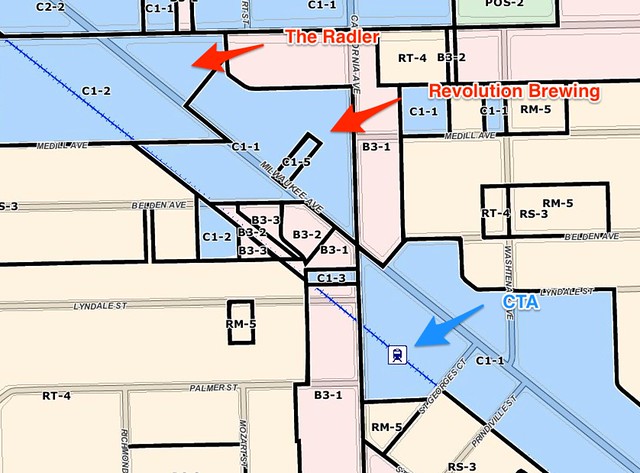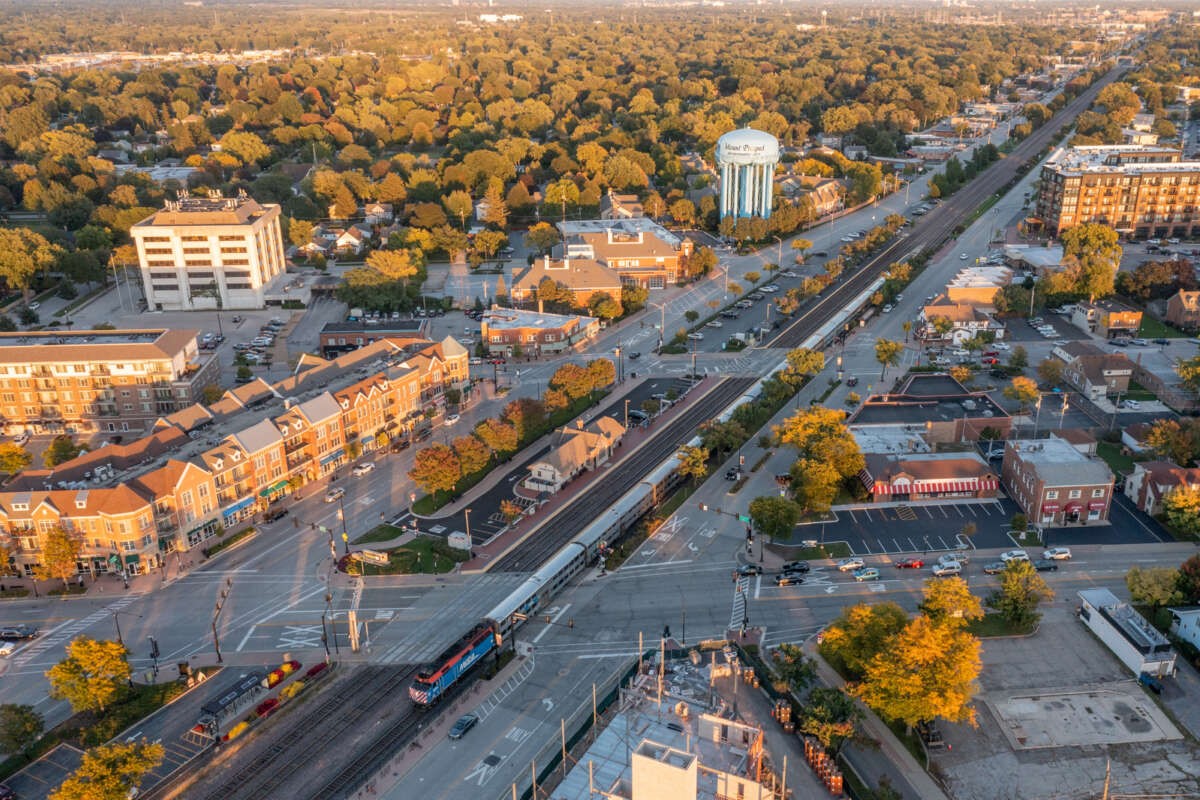A proposal to legalize transit-oriented development would make it easier to build walkable and bikeable neighborhoods, in part by halving the car parking requirement for residences and eliminating it for non-residential uses near train stations. The ordinance is set to go before aldermen at the zoning committee's next meeting in September. Right now, without the ordinance, launching a new business that complies with Chicago's parking minimums can be a ludicrous ordeal. Here's what two business owners in Logan Square had to go through to get around their parking minimums.
Revolution Brewing owner Josh Deth is also an urban planner and bicycling activist. When he envisioned repurposing an old sign manufacturing building in Logan Square for his restaurant and brewery, he didn't want to cram in the 11 car parking spaces that were required by law. It was like the city expected him to "chop down half the building," he said.
The solution, Deth found, was to get his property rezoned -- to change the law, essentially, so that it didn't require any car parking for Revolution Brewing.
In 2008, Deth set out to change the zoning from C1-1, which requires 22 car parking spaces and four bike parking spaces, to C1-5, which requires no car parking and two bike parking spaces. He hired a lawyer to help navigate the process of notifying all nearby property owners, holding a public meeting, and petitioning the alderman, zoning committee, and city council. All told, it took three months and cost a few thousand dollars.
Had Mayor Emanuel's proposed transit-oriented ordinance been in place, Deth would only have had to notify the alderman that he was going to build zero car parking spaces, and build 11 bike parking spaces, since the ordinance requires a 1:1 replacement. Revolution Brewing met the hypothetical bike parking requirement when it installed a bike corral. (That was also cumbersome for Deth, but CDOT has since streamlined the process.)

Another food entrepreneur launching a business this year had a different solution. Adam Hebert, a serial restaurant manager who grew up in Chicago, is opening The Radler and D.A.S., a Bavarian-style beer hall and restaurant, respectively. The Radler -- "bicyclist" in German, and also the name of a refreshing drink of beer and lemonade -- is located at 2375 N Milwaukee Avenue on a recently-enacted Pedestrian Street.
The law required Hebert to provide 2.5 car parking spaces. (We're not sure how anyone can provide half a parking space, but that's the law.) Hebert says it was out of the question:
In the Logan Square community, everybody bikes everywhere. It doesn't make sense to put in parking where people bike. I'd rather put in bike racks. Personally the fewer cars the better. Traffic is already so bad, environment is another huge reason. Think about the exercise you get, obesity epidemic cure, there are a million reasons you should take a bike over a car.
A few other factors made the parking requirement especially ridiculous here. Since the site is now on a Pedestrian Street, a curb cut isn't allowed, nor would the health department sign off on parking inside the restaurant (yes, this was considered). At the same time, all of the parking lots around the store were "completely booked," Hebert said.
Hebert asked Alderman Proco "Joe" Moreno to write a letter asking the zoning administrator to waive the parking requirement, and the request was recently approved.
Under the proposed TOD ordinance, Hebert wouldn't have had to worry about a thing. On Pedestrian Streets, non-residential uses within 1,200 feet of a train station would not have to provide parking.
Both business owners said they support the proposed ordinance. Deth said it "sounds great" and recounted how, as a member of Break The Gridlock, "[we] tried to have an impact on the zoning code rewrite" in the early 2000s. "No one was watching or paying attention to the zoning reform process," except for Metropolitan Planning Council Vice President Peter Skosey, Deth said. Skosey pointed me to the reforms MPC pushed for, including transit-oriented development. Deth also noted that urban designer Doug Farr was a consultant in the process and helped craft the idea of the Pedestrian Street.
When I told Hebert the ordinance's basics, he said, "I would totally be for that. Are you kidding me? That would be awesome."



